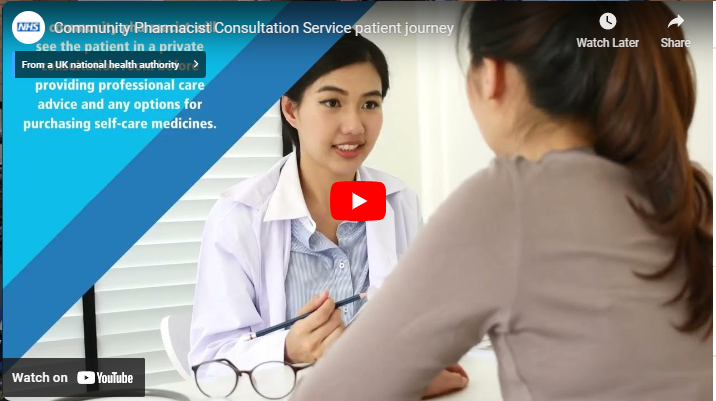PHARMACY FIRST
previously known as Community Pharmacist Consultation Service (CPCS)
For certain medical conditions, patients can now be seen by a local pharmacist for a consultation.
This will not only help to reduce treatment waiting time, but also help the right help to be provided at the right time.
What is the Pharmacy First (Community Pharmacy Consultation Service)?
This service is available nationally, for patients requiring low acuity advice, treatment or urgent repeat prescriptions.
The aim of the service is to help reduce patient waiting time, as well as reducing the pressure on the primary and urgent care system, including pressures on Accident and Emergency and GP out of hours.
When patient contact's the practice with certain medical concerns, practice staff will refer patients directly to the service.
Pharmacy will then contact the patient accordingly.
There is more information about this service on the following Government website: Pharmacy First: what you need to know – Department of Health and Social Care Media Centre (blog.gov.uk)
Which medical conditions can be self-referred to and treated by the pharmacy?
If your local Pharmacist believes you require prescription-only treatment, they may issue treatnent for the following conditions:
- earache (aged 1 to 17 years)
- impetigo (aged 1 year and over)
- infected insect bites (aged 1 year and over)
- shingles (aged 18 years and over)
- sinusitis (aged 12 years and over)
- sore throat (aged 5 years and over)
- urinary tract infections or UTIs (women aged 16 to 64 years)
How does it work?
If you are feeling unwell with any of the above conditions, visit your local participating pharmacy and ask for a private consultation with the pharmacist.
They will ask questions, may perform an examination and recommend best course of action based on your clinical needs, which could be by prescribing anti-viral medication or advising you on over-the-counter treatments. Read more on Healthwatch website: What can the Pharmacy First scheme do for me? | Healthwatch
Which other medical conditions can my GP refer me to the Pharmacy First for?
List of symptoms groups identified for referral to a community pharmacist (NHS Guidance)
This list is not exhaustive and may be a subject to limitations due to urgency or other factors.
- Acne, spots, and pimples
- Allergic reaction
- Ankle or foot pain or swelling
- Athlete’s foot
- Bites or stings, insect, or spider
- Blisters
- Constipation
- Cough
- Cold and ‘flu
- Diarrhoea
- Ear discharge or ear wax
- Earache
- Eye, red or irritable
- Eye, sticky or watery
- Eyelid problems
- Hair loss
- Headache
- Hearing problems or blocked ear
- Hip, thigh, or buttock pain or swelling itch
- Knee or lower leg pain
- Lower back pain
- Lower limb pain or swelling
- Mouth ulcers
- Nasal congestion
- Pain and/or frequency passing urine
- Rectal pain
- Scabies
- Scratches and grazes
- Sinusitis
- Shoulder pain
- Skin, rash
- Sleep difficulties
- Sore throat
- Teething
- Tiredness
- Toe pain or swelling
- Vaginal discharge
- Vaginal itch or soreness
- Vomiting
- Wound problems – management of dressings
- Wrist, hand, or finger pain or swelling
For more information about benefits of the service visit heathwatch website on: What can the Pharmacy First scheme do for me? | Healthwatch (opens in new page)
Contraceptive pill without a prescription from Pharmacy
Visit NHS website for list of pharmacies offering this service on following NHS website: Find a pharmacy that offers the contraceptive pill without a prescription - NHS (www.nhs.uk)
More services at local Pharmacy
Other services that may be available at a local pharmacy include:
- new medication guidance
- chlamydia screening and treatment
- advice and help on how to stop smoking
- cholesterol and blood sugar testing
- the substance misuse service, including needle and syringe exchange schemes
- advice and help on how to manage your weight
Ask a local pharmacist to find out what services they offer visit NHS website on: How pharmacies can help - NHS (www.nhs.uk) (opens in new window)
